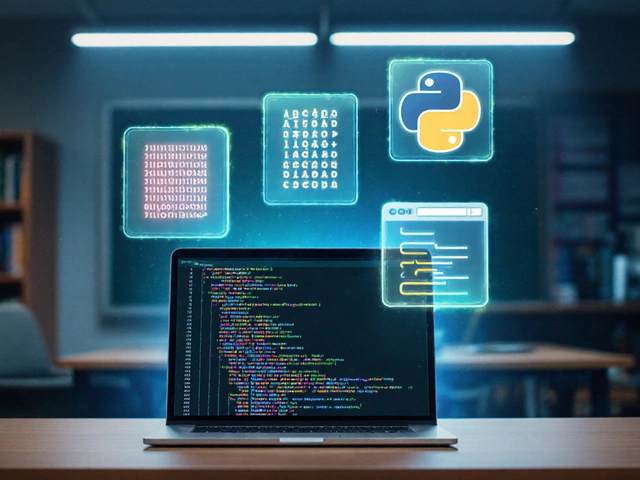
Diving into the world of coding often prompts the question: do you need to excel at math? While math and logic are connected at the hip, it doesn't mean you need a Ph.D. in mathematics to thrive in programming. Many coding tasks rely on creativity, problem-solving, and the ability to think logically rather than on complex mathematical equations.
Certain areas of programming—like game development or machine learning—may require a stronger grasp of math. Still, ample opportunities exist for those who aren't particularly math-savvy. Understanding the level of math needed in your desired field of coding can help set clear learning goals.
- The Relationship Between Math and Coding
- Coding Without Advanced Math
- Math-Heavy Programming Disciplines
- Real-World Applications
- Tips for Improving Your Coding Skills
- Resources for Learning Coding
The Relationship Between Math and Coding
Understanding the connection between math and coding can be pivotal for anyone stepping into the world of programming. At its core, coding is about problem-solving and logical thinking, both of which are underpinned by mathematical concepts. Even though the complexity of math required varies from one coding discipline to another, its foundational role is undeniable. Consider the logic gates in computer science, for instance. They are directly derived from Boolean algebra, a branch of math that deals with true or false values. These logical constructs form the basis of binary code, the very language computers understand.
But, don't get disheartened if math is not your forte. Coding embraces various languages and environments, many of which need minimal math skills. For example, HTML, CSS, and basic JavaScript often rely more on understanding syntax and structure than mathematical prowess. These languages are the building blocks for many web applications, demonstrating that basic math understanding suffices in numerous coding scenarios.
One might think that without an aptitude for numbers, entering fields like data science or AI is impossible. Yet, technology provides tools that abstract complex mathematical operations, making life easier for programmers regardless of their background. A great number of software libraries are designed to manage the heavy lifting of mathematical computations, allowing coders to focus on logic and design. This has significantly lowered the barrier to entry, enabling many to thrive even in areas conventionally dominated by those with strong math skills.
Interestingly, a survey by Stack Overflow revealed that only about one-third of coders regularly use advanced math concepts in their daily tasks. This fact underscores a broader truth—math is not the sole determinant of success in programming. Mark Zuckerberg, the renowned tech icon, once mentioned, "You don't need to have state-of-the-art computation skills to create life-altering apps; sometimes, a novel idea is all that it takes." His words remind us that great programmers often rely on diverse skills beyond just math.
Exploring the math involved in coding does have its merits. For instance, understanding algorithms and data structures often requires a grasp of algebra and statistics. These concepts are vital for optimizing performance and developing efficient programs. In particular, game developers and computer graphics specialists might delve into linear algebra and calculus because these fields demand a detailed understanding of transformations and geometrical calculations.
Despite the varying degrees of math needed across different areas of programming, what's crucial is developing a problem-solving mindset. Coders are like architects of the digital world, using diverse tools to construct innovative solutions. This requires logical thinking as much as, if not more than, mathematical skill. If you're eager to enhance your programming knack, cultivate the ability to think both critically and creatively. You don't need to love math—but recognizing its influence might just enrich your coding journey.
Coding Without Advanced Math
Coding is a vast landscape where not every path requires a strong foundation in advanced mathematics. While math skills can definitely be an asset in some areas, many successful programmers demonstrate that exceptional math isn't a necessity for many coding roles. The ability to think logically, dissect problems, and creatively devise solutions are often more critical skills in the coding arena. For instance, web development is a field brimming with opportunities where developers focus more on coding languages like HTML, CSS, and JavaScript, cutting down on heavy-duty calculations but not compromising on innovation.
In fact, coding itself is akin to learning a new language, with its syntax, rules, and methods. It encourages a mindset similar to solving puzzles. Think about applying CSS to beautify a web page; it involves understanding layouts and color schemes more than running equations. JavaScript, another popular language, revolves around logical thinking and script writing, touching on loops and conditionals but not diving deep into intense math formulas. With the rise of various frameworks and libraries, a beginner can launch a functional site with minimal coding expertise, let alone intricate math skills.
Programming, especially in web or mobile app development, often requires an understanding of how to connect and manipulate data rather than solve complex mathematical problems. For example, consider the popular social media apps that run seamlessly on various devices; the heart of their success lies in user experience design and efficient backend systems' execution. It's not about equations but about ensuring the user-friendly nature and interactivity of the app. This feature of programming has allowed a diverse range of people to enter the tech world, crossing the barrier of needing to be math experts.
"Programming is not about spinning up complicated algorithms or solving equations alone. It's about understanding problems and intuitively finding ways to address them," shares James Gosling, creator of Java. His insight portrays programming as an art of solution-finding, a skill achievable with or without advanced math skills.Despite common misconceptions, the tech industry embraces diversity in talent, valuing creativity, innovation, and problem-solving abilities as much as traditional math prowess. With online resources, tutorials, and interactive coding platforms, anyone can cultivate these skills and explore coding's vast opportunities.
Moreover, the importance of collaboration and teamwork cannot be emphasized enough in coding projects. Often, projects require people to wear different hats; some might focus on artistry or the user experience interface, while others might handle logic and structural integrity coding. Such diversification highlights that each person's contribution is pivotal to success, reducing the weight on any single skill set, including math skills.
| Area of Coding | Math Requirement |
|---|---|
| Web Development | Minimal |
| App Development | Moderate to Low |
| Data Science | High |
| Game Development | Moderate |
Ultimately, the coding world is vast with realms suiting varied skill sets. With the evolution of tools that automate complex mathematical functions, individuals are unburdened, allowing them to focus on their strengths in coding. Exploring coding should be about leveraging one's creativity and curiosity, not being deterred by the pressure of mastering advanced math. Therefore, aspiring programmers should believe in possibilities and jump into coding, affirming that the right doors will open irrespective of one's math skills.

Math-Heavy Programming Disciplines
When delving into the world of programming, one quickly discovers that certain disciplines heavily rely on mathematical concepts. Fields like data science, artificial intelligence (AI), and graphics programming are excellent examples of areas where a strong mathematical foundation is often necessary. Data scientists, for instance, employ statistics and probability to draw insightful conclusions from vast datasets. In AI, algorithms—the backbone of intelligent behavior—are steeped in linear algebra, calculus, and probability theory.
Consider graphics programming, which offers another perfect intersection of math and coding. Creating realistic animations and 3D models requires a solid understanding of geometry and calculus. Developers need to know how to manipulate shapes and objects within a three-dimensional space. Game engines often use math-heavy algorithms to simulate physics, making the virtual world seem more tangible to the player. In this domain, the contribution of math to precise coding is both profound and indispensable.
"Without mathematics, there's nothing you can do. Everything around you is mathematics. Everything around you is numbers." - Shakuntala Devi
Finance is another sector where math and programming converge significantly. Here, programmers build models to predict market trends, requiring a deep understanding of algorithms and statistics. Financial software might also include risk assessment tools, which involve probability and statistical analysis to help reduce uncertainty and potential losses. In these math-intensive roles, a programmer's ability to code often hinges on their capacity to grasp and apply mathematical theories.
Further underlining the importance of math are the programming jobs in network security and cryptography. Cryptographers develop complex algorithms to protect sensitive data, and this field has a rich foundation in number theory. To build secure applications, knowledge of modular arithmetic and prime numbers is crucial. Even simple encryption methods draw from these mathematical concepts. Lastly, though it might sound unexpected, understanding statistics can also help in user experience (UX) design, as analyzing user feedback and testing results requires some statistical know-how.
If you're wondering whether these disciplines can be tackled without a strong math background, the answer is nuanced. The secret lies in a programmer's ability to collaborate effectively. Due to the interdisciplinary nature of many tech projects, working in teams with mathematicians or statisticians can bridge gaps in knowledge. Moreover, tech industries are increasingly crafting tools and frameworks that abstract complex math, allowing novices to create without mastering the mathematical underpinnings entirely. Yet, cultivating a strong understanding of mathematics can significantly empower a programmer, enriching the solutions they create and the problems they tackle.
Real-World Applications
Understanding how math intertwines with coding in the real world can help dispel many myths around the necessity of strong math skills in every programming career. To start, let's consider web development, a crucial area where the basic concepts of arithmetic and logic often suffice. Developers predominantly focus on HTML, CSS, and JavaScript, working to create visually appealing and user-friendly websites. Although there is an underlying set of mathematical principles in algorithms and data structures, they usually don’t require anything beyond high school math.
On the contrary, data science is a field where math, specifically statistics, plays a significant role. Data scientists handle vast datasets to predict trends or customer behavior, and they use probability theory and statistical inference constantly. A typical day might involve calculating the mean, median, or standard deviation, using regression models, and understanding distributions. These tasks indeed demand a higher level of mathematical expertise. As noted by the insight from Hal Varian, Chief Economist at Google,
“I keep saying the sexy job in the next ten years will be statisticians, because data’s cheap, data’s plentiful. But understanding it is the tough part.”
Another exciting area is machine learning, which often requires a solid grasp of linear algebra and calculus, particularly when working with neural networks and backpropagation methods. Writing code in machine learning involves applying mathematical models to improve self-learning algorithms, making them more accurate and efficient. The intersection of advanced math and coding is essential in these instances; thus, aspiring machine learning engineers should embrace mathematics as part of their toolkit.
When it comes to game development, math is important but not exclusively essential. Developers working with graphics or physics engines might need to understand vectors, matrices, and geometric calculations. Games that simulate real-world physics or complex 3D environments get their realism from mathematical models. Hence, comprehending the underlying math can lead to more realistic and engaging game experiences. Yet, despite the necessity of some mathematical proficiency, many tools and libraries simplify these processes, allowing developers to focus more on creativity and innovation.
Cybersecurity experts also deal with math in encryption algorithms protecting sensitive data. Algorithms often employ number theory and algebra to create secure systems. As cybersecurity grows ever more crucial, the demand for individuals who blend coding and mathematical insight increases, further showcasing a real-world application where coding and math mesh seamlessly.
The integration of coding and math varies greatly depending on the field. While some areas like data science and machine learning demand rigorous math, others, like web development, do not. It’s essential for aspiring coders to research their field of interest thoroughly, identifying the specific math skills required and tailoring their learning journey accordingly.

Tips for Improving Your Coding Skills
Embarking on a journey through the world of coding can be both exhilarating and overwhelming. The constant evolution of technology ensures there's always something new to learn. One of the most effective ways to improve your coding skills is through practice. Just like any other skill, coding proficiency comes with repeated exposure and hands-on experience. Start by dedicating a specific amount of time each day solely to code. Whether it's an hour or just fifteen minutes, consistency is key. This helps reinforce the learning and makes coding as much a part of your daily routine as drinking your morning coffee.
Another valuable method is to engage with the vibrant coding community online. Websites like Stack Overflow not only provide solutions to specific problems but the discussions can also give insights into different ways of approaching and solving coding challenges. Pair programming, an agile software development technique where two programmers work together at one workstation, is another excellent opportunity. It allows you to see firsthand how others think about problem-solving and coding strategies. This exposure to different perspectives can significantly broaden your own coding toolkit.
Sometimes, it's easy to forget to leverage the wealth of resources already available at our fingertips. Books, online courses, and tutorials can provide structured learning and depth that informal coding might miss. Websites like Codecademy and Coursera offer comprehensive courses on various programming languages, from beginners to advanced learners. Don't underestimate the power of reading. Books like “Clean Code: A Handbook of Agile Software Craftsmanship” by Robert C. Martin have been praised by many developers for providing essential insights into writing good code.
"The only way to learn a new programming language is by writing programs in it." — Dennis Ritchie
Practical application is also crucial. Start by building small projects. It doesn't have to be perfect, but creating something from scratch helps solidify your understanding of key concepts. Start with a basic website, an interactive calculator, or perhaps a simple game. These projects not only enhance your skills but also build a tangible portfolio of your work. Remember the classic programming projects such as a to-do list app or a cryptocurrency tracking dashboard. These projects often provide a solid foundation and can be scaled or modified to stretch your skills further as you progress.
Feedback, though sometimes hard to swallow, is incredibly beneficial. Seek out code reviews and engage in discussions where your code is evaluated by others more experienced. This constructive criticism can provide new angles to explore and improve your coding prowess. Don't just focus on the code itself, but also strive to understand the rationale behind each suggestion. Over time, this habit of review and reflection makes a marked improvement in the quality of your work.
Finally, let's not forget the importance of mathematics. While not all coding requires advanced math, developing a comfort with numbers, logic, and analytical thinking can assist in tackling complex algorithms. Consider brushing up on basic algebra or get familiar with statistical analysis through online resources available abundantly.
Resources for Learning Coding
Embarking on the journey to become proficient in coding can be both inspiring and overwhelming. Thankfully, the myriad of resources available today provides numerous ways to acquire coding knowledge, regardless of your math skills. To get started, online platforms like Codecademy and Coursera offer interactive courses in programming. These sites cater to all levels, from beginners to advanced programmers, and cover various programming languages such as Python, JavaScript, and C++.
For those who thrive on structured learning, enrolling in bootcamps like General Assembly or Flatiron School is an excellent choice. These bootcamps often provide immersive and intensive programs that focus on practical, project-based learning. They are designed to equip you with the necessary skills and portfolio to enter the job market successfully. Many bootcamps also offer career services, helping connect graduates with potential employers.
A wealth of tutorials and programming guides exists on platforms such as YouTube and GitHub, which explain complex coding concepts in simple terms. YouTube channels like "The Net Ninja" and "Traversy Media" break down techniques and frameworks, while GitHub gives you access to vast libraries of code repositories contributed by millions of developers across the globe.
Reading is another powerful way to grasp coding skills. Books like "Eloquent JavaScript" by Marijn Haverbeke and "Python Crash Course" by Eric Matthes provide clear, concise instructions accompanied by exercises to test your understanding. These books tackle coding in a hands-on manner, encouraging you to write and execute your code, thereby reinforcing learning through doing.
Networking within a community of like-minded individuals can prove invaluable. Platforms like Stack Overflow not only allow you to ask questions and seek advice from experienced programmers but also to offer solutions to others, which deepens your understanding. Meetups and hackathons are also great opportunities to collaborate with peers, work on projects, and learn from each other's strengths and experiences.
"Learning to write programs stretches your mind, and helps you think better, creates a way of thinking about things that I think is helpful in all domains." - Bill Gates
For an organized schedule, consider using online schedules and planners like Trello or Notion to track your progress and set achievable goals. Consistent practice is key, so dedicating a certain number of hours each week to coding can significantly improve your skills over time. Whether you choose to learn through a formal program or self-study, the important thing is to remain curious and persistent in your coding journey.




